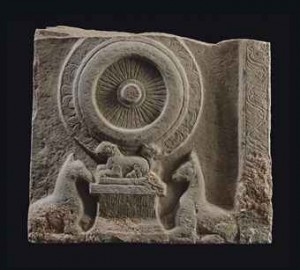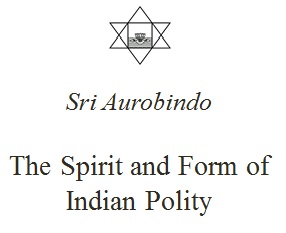
In Part 2, we began by examining the political principle in Ancient Greece and India. We observed three defining characteristics of Indian society and Polity, that
1. Despite the strong religious and spiritual bent of the Indian race, the real political power remained with the king, the Kshatriyas and the commons.
2. As in all of life, and so too in polity, the king consulted with, and took guidance from the Rishis, those who were known and felt to be apolitical truth-seekers.
3. The role of the king in India was more of a constitutional monarch, not autocratic, and his reign was dependent on the “continued will and assent of the people”. 1
But this is as yet an incomplete picture. For we may still ask – who, or what was greater than the King? In answering this question, we see another, a fourth characteristic of Indian polity, the role of Dharma.
The fourth characteristic
“A greater sovereign than the king was the Dharma, the religious, ethical, social, political, and customary law organically governing the life of the people. This impersonal authority was considered sacred and eternal in its spirit and the totality of its body, always characteristically the same, the changes organically and spontaneously brought about in its actual form by the evolution of the society; and it must be noted that with the Dharma no secular authority had any right of autocratic interference. The Brahmins themselves were recorders and exponents of the Dharma, not its creators nor authorised to make at will any changes, the king was only the guardian, executor and servant of the Dharma, charged to see to its observance and to prevent offences, serious irregularities and breaches. He himself was bound the first to obey it and observe the rigorous rule it laid on his personal life and action and on the province, powers and duties of his regal authority and office.” 2
We may ask at this point if adhering to Dharma was only an abstraction, if it had any real-world consequences? Could kings legislate and issue decrees freely? What held them back, if anything at all?
The fifth characteristic
“This subjection of the sovereign power to the Dharma was not an ideal theory inoperative in practice; for the rule of the socio-religious law actively conditioned the whole life of the people and was therefore a living reality, and it had in the political field very large practical consequences. It meant first that the king had not the power of direct legislation and was limited to the issue of administrative decrees that had to be in consonance with the religious, social, political, economic constitution of the community”,and importantly,“neither could he disregard in the general tenor and character and the effective result of his administration the express or tacit will of the people.” 3
The King, the Law and the Courts
“In the sphere of administration the power of the king was similarly hedged in by the standing constitution of the Dharma. His right of taxation was limited in the most important sources of revenue to a fixed percentage as a maximum. The king was in person the Supreme Court and the highest control in the execution of the civil and criminal law, but here too his role was that of the executor: he was bound to administer the law faithfully as it stood through his judges or with the aid of the Brahmin legists learned in these matters. He had the complete and unfettered control in his Council only of foreign policy, military administration and war and peace and of a great number of directive activities. He was free to make efficient arrangements for all that part of the administration that served to secure and promote the welfare of the community, good order, public morals, and all such matters as could best be supervised or regulated by the sovereign authority.” 4
No room for absolutism
“There could therefore be ordinarily little or no room in the ancient Indian system for autocratic freak or monarchical violence and oppression, much less for the savage cruelty and tyranny of so common an occurrence in the history of some other countries. Nevertheless such happenings were possible by the sovereign’s disregard of the Dharma or by a misuse of his power of administrative decree…. The legists provided for the possibility of oppression. In spite of the sanctity and prestige attaching to the sovereign it was laid down that obedience ceased to be binding if the king ceased to be faithful executor of the Dharma. Incompetence and violation of the obligation to rule to the satisfaction of the people were in theory and effect sufficient causes for his removal. Manu even lays it down that an unjust and oppressive king should be killed by his own subjects like a mad dog, and this justification by the highest authority of the right or even the duty of insurrection and regicide in extreme cases is sufficient to show that absolutism or the unconditional divine right of kings was no part of the intention of the Indian political system.” 5
A detailed study of the ancient Indian polity will show us that the system was remarkably well thought out; there was ample scope for free variation of social units. Sri Aurobindo remarked that the system allowed for a very
“complex communal freedom and self-determination, each group unit of the community having its own natural existence and administering its own proper life and business, set off from the rest by a natural demarcation of its field and limits, but connected with the whole by well-understood relations, each a co-partner with the others in the powers and duties of the communal existence, executing its own laws and rules, administering within its own proper limits, joining with the others in the discussion and the regulation of matters of a mutual or common interest and represented in some way and to the degree of its importance in the general assemblies of the kingdom or empire.” 6
The State : a means of coordination
“The State, sovereign or supreme political authority was an instrument of coordination and of a general control and efficiency and exercised a supreme but not an absolute authority; for in all its rights and powers it was limited by the Law and by the will of the people and in all its internal functions only a co-partner with the other members of the socio-political body.” 7
An Organic, self-determining communal life
“The one principle permanent at the base of construction throughout all the building and extension and rebuilding of the Indian polity was the principle of an organically self-determining communal life,—self-determining not only in the mass and by means of the machinery of the vote and a representative body erected on the surface, representative only of the political mind of a part of the nation, which is all that the modern system has been able to manage, but in every pulse of its life and in each separate member of its existence.” 8
These profound insights on the body politic of ancient India demonstrate a keen awareness of what would help achieve a truly democratic and secular co-existence. They recognised, for their time and age, how best to apply the democratic principle and tried in their own unique way to implement it in their collective life. India then experienced a millenium of foreign rule and conquests which introduced into Indian polity the idea of autocratic rule. As Sri Aurobindo remarked : “The pure absolutist type of monarchy entered India with the Mahomedans who had taken it from Europe and Persia and it has never been accepted in its purity by the Hindu temperament.” Mughal rule was followed by two centuries of British domination, the freedom from which eventually led to the fledgling democracy of modern India. But what are the origins of this ‘modern’ democracy? It is to this that we turn to in the next article, starting with eighteenth century England and the the idea of a parliament.
(series edited by Uday Arya)
Other articles in this series
Part 1 | Part 2 | Part 3 | Part 4 | Part 5 | Part 6 | Part 7
“All political ideals must have relation to the temperament and past history of the race.” – Sri Aurobindo
Notes
- Sri Aurobindo noted two important exceptions in Indian history – the monarchy of Chandragupta and that of Asoka. To see the context of this writing, see the 4th paragraph of his article The Early Indian Polity (Bande Mataram, 20 March 1908 ↩
- Sri Aurobindo, The Foundations of Indian Culture, Indian Polity-1 ↩
- ibid ↩
- ibid ↩
- ibid ↩
- Sri Aurobindo, The Foundations of Indian Culture, Indian Polity-2 ↩
- ibid ↩
- ibid ↩






